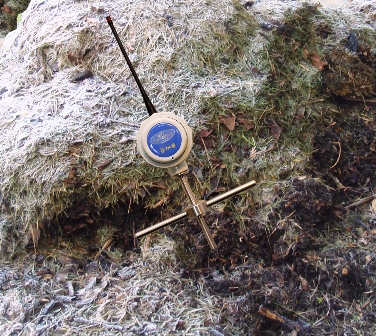
Data logging experts Signatrol has launched a new probe as part of its SpYdaq wireless temperature and humidity monitoring system that is ideal for monitoring the temperature of decomposing waste during the compost process.
Production of compost must be undertaken in controlled conditions and it is essential to ensure that waste material, which is left to self-heat in storage tunnels, achieves more than 73C. The special SpYdaq probes are used to record temperature in the compost, with data sent to a BaseStation which then passes it to a PC either via a Modbus RTU or by GPRS direct to the SpYdaq website.
All data collected is managed via PC, with accurate results available on-line at any time allowing for accurate monitoring of temperature even from remote locations.
Since the whole system is wireless, there is no need for the financial outlay or inconvenience of hardwiring, making SpYdaq particularly suitable for rural locations such as recycling centres and farms. The absence of hard wiring also means there are no issues with heavy vehicles such as tractors and trucks being caught up in wiring.
The SpYdaq BaseStation can receive data from up to 16 remote transmitters. Each remote transmitter can have up to three inputs - temperature, relative humidity and universal - and sends it via a licence-free ISM radio band using a sophisticated data redundancy system (patent pending) to ensure virtually error free data acquisition. Antenna diversity is another feature that is also provided and which enables multiple antennas to be connected to ensure reliable radio connection from diverse areas.
Users can choose from up to 16 transmitters to be located at points for monitoring. In addition to the Compost Sensor, room sensors, duct sensors, external sensors, immersion sensors, pipe mount sensors and fridge/freezer/oven sensors are also available and can be combined to suit the required application.
SpYdaq's wide range of inputs means that by connecting to the appropriate sensor, virtually any parameter can be measured and accurately logged.
The BaseStation also checks locally for alarm conditions via its inbuilt audio and visual alarms. Local alarming means that any potential trouble spots can be identified quickly and corrective action taken; this often saves vulnerable goods from damage or rapid decay. SMS alarm messages can also be automatically sent to a number of mobile phones to advise users remotely that an alarm has occurred.
This is particularly suitable to multi-site operations allowing the site or operations manager to easily track temperature control at any site, using real time information rather than having to rely on paper based readings.